HND Hospitality: Consumer Behaviour and Insight at The Ritz London
VerifiedAdded on 2023/06/18
|13
|3851
|193
Report
AI Summary
This report investigates consumer behaviour and insights within the hospitality sector, using The Ritz London as a case study. It examines cultural, social, personal, and psychological factors influencing consumer decisions, as well as the impact of digital technology on consumer trends. The report maps the consumer decision-making journey, highlighting the importance of each stage for hospitality businesses. A comparison of B2B and B2C complexities in hospitality decision-making is provided, along with an evaluation of market research approaches and methods. Finally, the report discusses how marketers can influence various stages of the hospitality decision-making process, offering valuable insights for industry professionals. Desklib provides access to this report, along with a wealth of study resources including past papers and solved assignments.
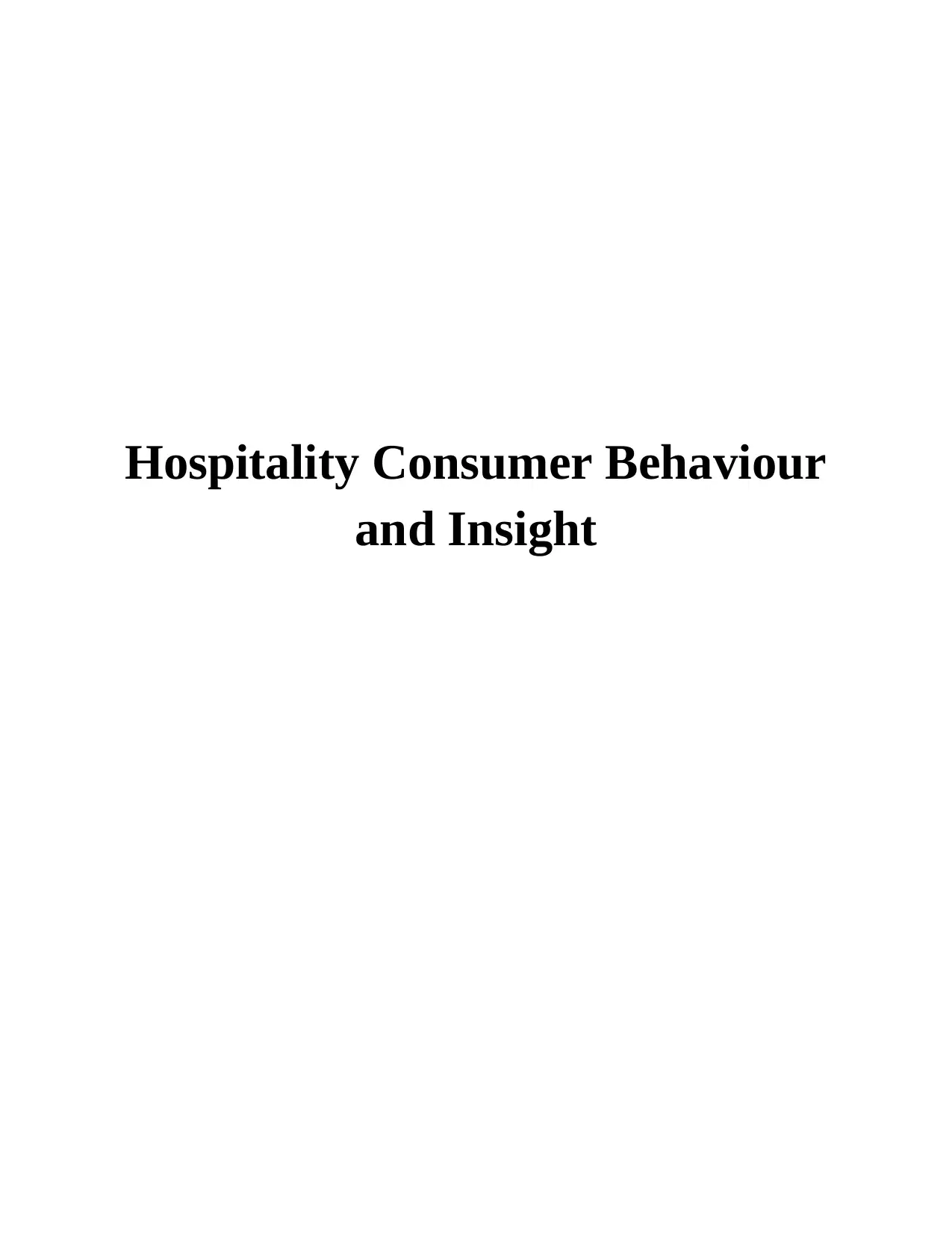
Hospitality Consumer Behaviour
and Insight
and Insight
Paraphrase This Document
Need a fresh take? Get an instant paraphrase of this document with our AI Paraphraser
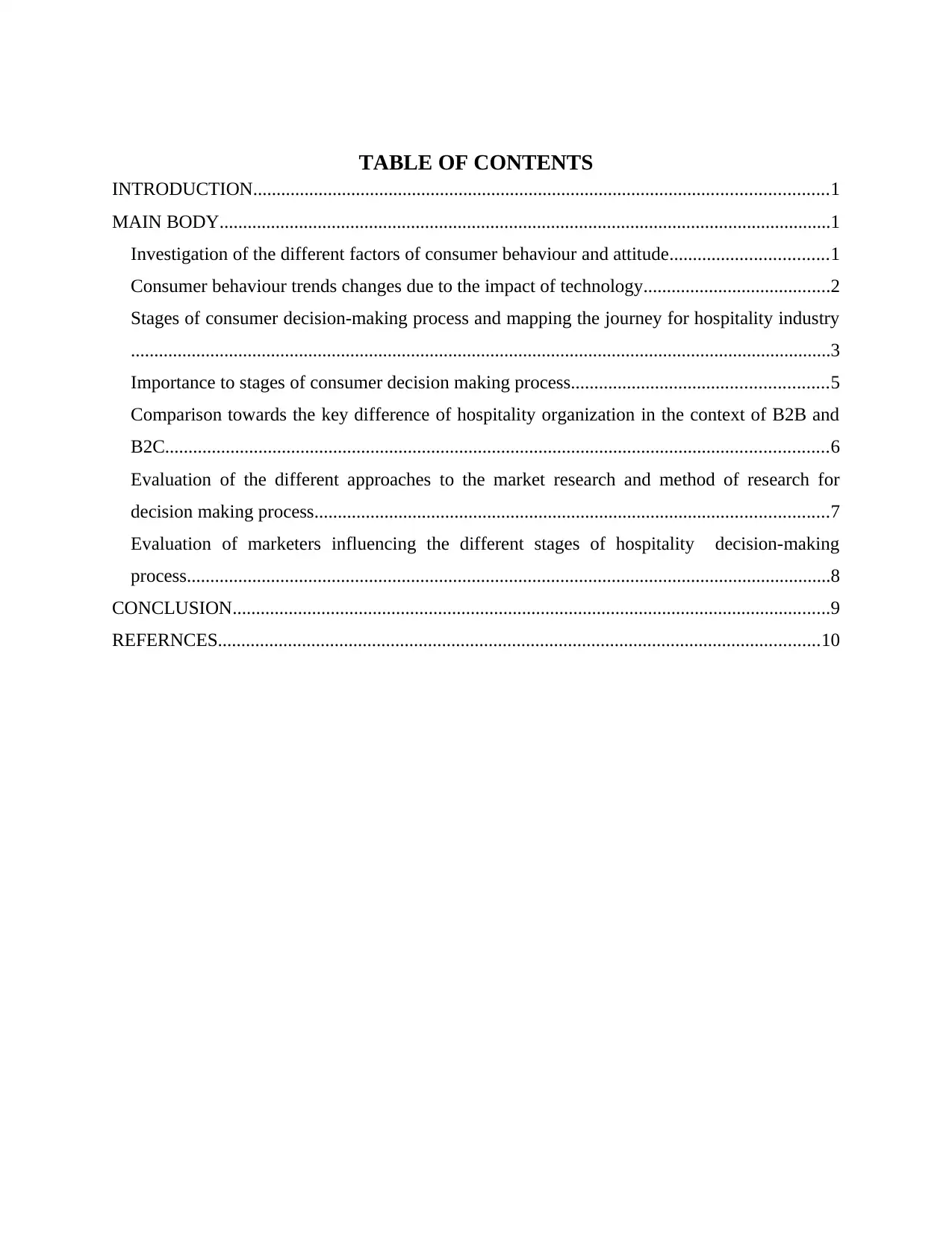
TABLE OF CONTENTS
INTRODUCTION...........................................................................................................................1
MAIN BODY...................................................................................................................................1
Investigation of the different factors of consumer behaviour and attitude..................................1
Consumer behaviour trends changes due to the impact of technology........................................2
Stages of consumer decision-making process and mapping the journey for hospitality industry
......................................................................................................................................................3
Importance to stages of consumer decision making process.......................................................5
Comparison towards the key difference of hospitality organization in the context of B2B and
B2C..............................................................................................................................................6
Evaluation of the different approaches to the market research and method of research for
decision making process..............................................................................................................7
Evaluation of marketers influencing the different stages of hospitality decision-making
process..........................................................................................................................................8
CONCLUSION................................................................................................................................9
REFERNCES.................................................................................................................................10
INTRODUCTION...........................................................................................................................1
MAIN BODY...................................................................................................................................1
Investigation of the different factors of consumer behaviour and attitude..................................1
Consumer behaviour trends changes due to the impact of technology........................................2
Stages of consumer decision-making process and mapping the journey for hospitality industry
......................................................................................................................................................3
Importance to stages of consumer decision making process.......................................................5
Comparison towards the key difference of hospitality organization in the context of B2B and
B2C..............................................................................................................................................6
Evaluation of the different approaches to the market research and method of research for
decision making process..............................................................................................................7
Evaluation of marketers influencing the different stages of hospitality decision-making
process..........................................................................................................................................8
CONCLUSION................................................................................................................................9
REFERNCES.................................................................................................................................10
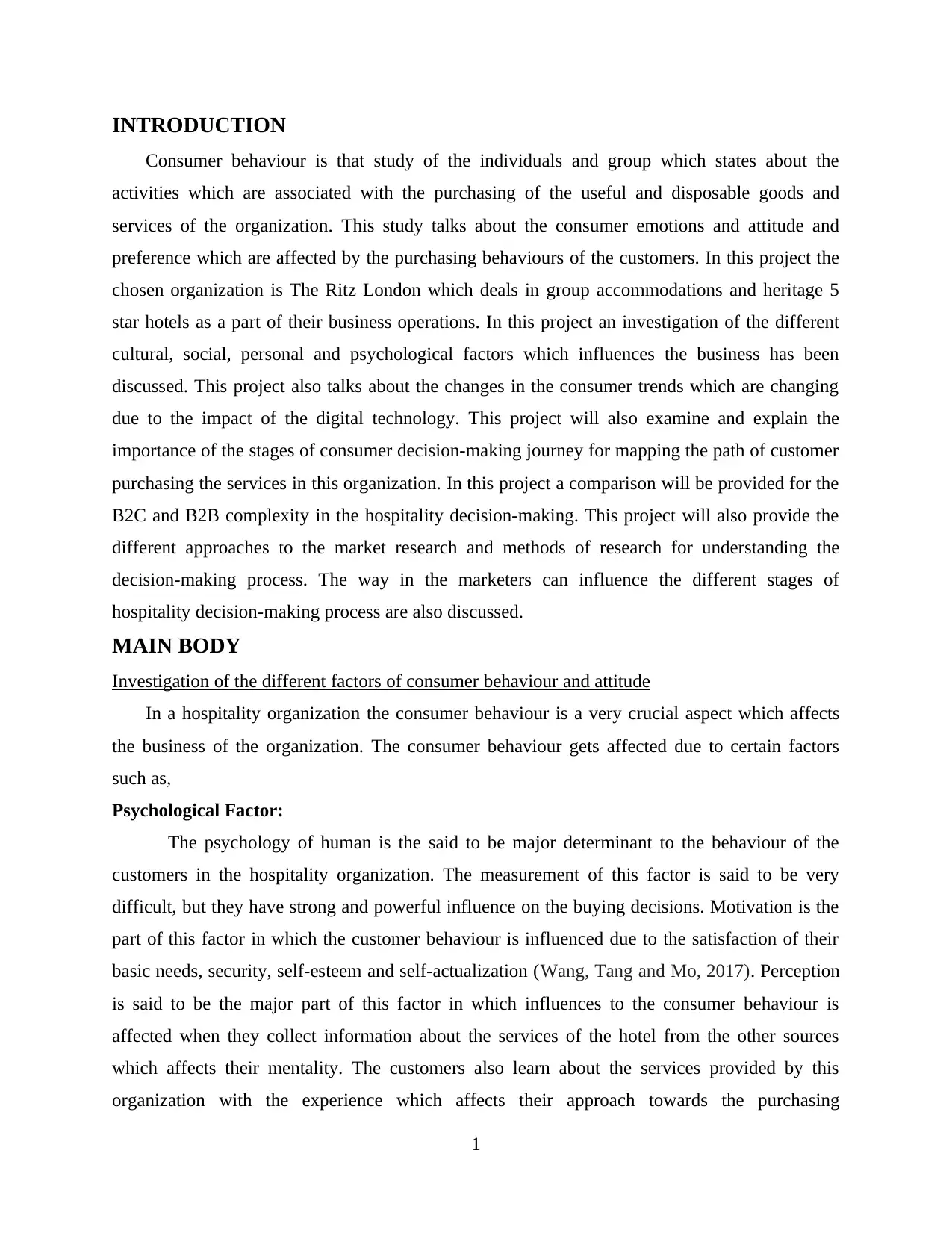
INTRODUCTION
Consumer behaviour is that study of the individuals and group which states about the
activities which are associated with the purchasing of the useful and disposable goods and
services of the organization. This study talks about the consumer emotions and attitude and
preference which are affected by the purchasing behaviours of the customers. In this project the
chosen organization is The Ritz London which deals in group accommodations and heritage 5
star hotels as a part of their business operations. In this project an investigation of the different
cultural, social, personal and psychological factors which influences the business has been
discussed. This project also talks about the changes in the consumer trends which are changing
due to the impact of the digital technology. This project will also examine and explain the
importance of the stages of consumer decision-making journey for mapping the path of customer
purchasing the services in this organization. In this project a comparison will be provided for the
B2C and B2B complexity in the hospitality decision-making. This project will also provide the
different approaches to the market research and methods of research for understanding the
decision-making process. The way in the marketers can influence the different stages of
hospitality decision-making process are also discussed.
MAIN BODY
Investigation of the different factors of consumer behaviour and attitude
In a hospitality organization the consumer behaviour is a very crucial aspect which affects
the business of the organization. The consumer behaviour gets affected due to certain factors
such as,
Psychological Factor:
The psychology of human is the said to be major determinant to the behaviour of the
customers in the hospitality organization. The measurement of this factor is said to be very
difficult, but they have strong and powerful influence on the buying decisions. Motivation is the
part of this factor in which the customer behaviour is influenced due to the satisfaction of their
basic needs, security, self-esteem and self-actualization (Wang, Tang and Mo, 2017). Perception
is said to be the major part of this factor in which influences to the consumer behaviour is
affected when they collect information about the services of the hotel from the other sources
which affects their mentality. The customers also learn about the services provided by this
organization with the experience which affects their approach towards the purchasing
1
Consumer behaviour is that study of the individuals and group which states about the
activities which are associated with the purchasing of the useful and disposable goods and
services of the organization. This study talks about the consumer emotions and attitude and
preference which are affected by the purchasing behaviours of the customers. In this project the
chosen organization is The Ritz London which deals in group accommodations and heritage 5
star hotels as a part of their business operations. In this project an investigation of the different
cultural, social, personal and psychological factors which influences the business has been
discussed. This project also talks about the changes in the consumer trends which are changing
due to the impact of the digital technology. This project will also examine and explain the
importance of the stages of consumer decision-making journey for mapping the path of customer
purchasing the services in this organization. In this project a comparison will be provided for the
B2C and B2B complexity in the hospitality decision-making. This project will also provide the
different approaches to the market research and methods of research for understanding the
decision-making process. The way in the marketers can influence the different stages of
hospitality decision-making process are also discussed.
MAIN BODY
Investigation of the different factors of consumer behaviour and attitude
In a hospitality organization the consumer behaviour is a very crucial aspect which affects
the business of the organization. The consumer behaviour gets affected due to certain factors
such as,
Psychological Factor:
The psychology of human is the said to be major determinant to the behaviour of the
customers in the hospitality organization. The measurement of this factor is said to be very
difficult, but they have strong and powerful influence on the buying decisions. Motivation is the
part of this factor in which the customer behaviour is influenced due to the satisfaction of their
basic needs, security, self-esteem and self-actualization (Wang, Tang and Mo, 2017). Perception
is said to be the major part of this factor in which influences to the consumer behaviour is
affected when they collect information about the services of the hotel from the other sources
which affects their mentality. The customers also learn about the services provided by this
organization with the experience which affects their approach towards the purchasing
1
⊘ This is a preview!⊘
Do you want full access?
Subscribe today to unlock all pages.

Trusted by 1+ million students worldwide
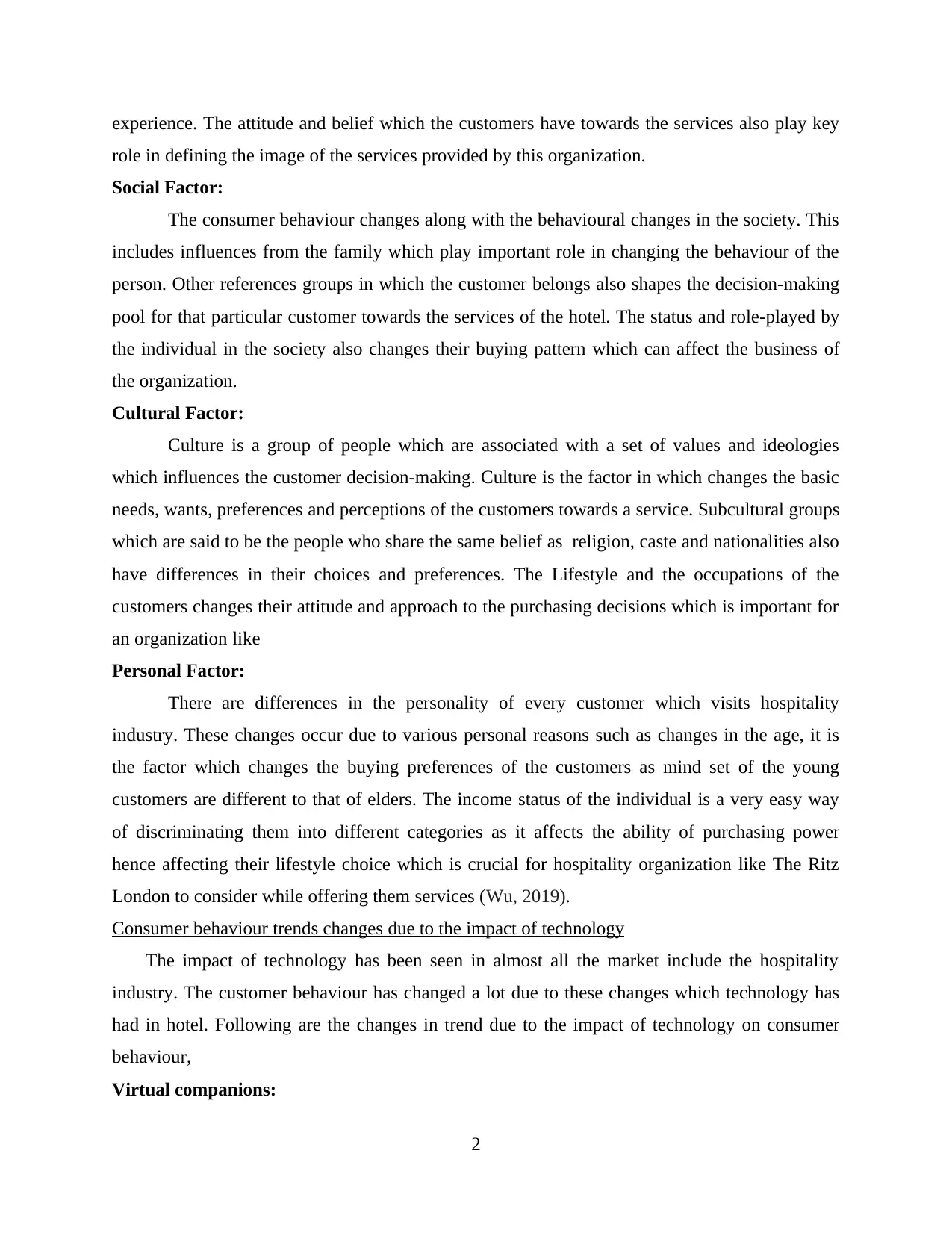
experience. The attitude and belief which the customers have towards the services also play key
role in defining the image of the services provided by this organization.
Social Factor:
The consumer behaviour changes along with the behavioural changes in the society. This
includes influences from the family which play important role in changing the behaviour of the
person. Other references groups in which the customer belongs also shapes the decision-making
pool for that particular customer towards the services of the hotel. The status and role-played by
the individual in the society also changes their buying pattern which can affect the business of
the organization.
Cultural Factor:
Culture is a group of people which are associated with a set of values and ideologies
which influences the customer decision-making. Culture is the factor in which changes the basic
needs, wants, preferences and perceptions of the customers towards a service. Subcultural groups
which are said to be the people who share the same belief as religion, caste and nationalities also
have differences in their choices and preferences. The Lifestyle and the occupations of the
customers changes their attitude and approach to the purchasing decisions which is important for
an organization like
Personal Factor:
There are differences in the personality of every customer which visits hospitality
industry. These changes occur due to various personal reasons such as changes in the age, it is
the factor which changes the buying preferences of the customers as mind set of the young
customers are different to that of elders. The income status of the individual is a very easy way
of discriminating them into different categories as it affects the ability of purchasing power
hence affecting their lifestyle choice which is crucial for hospitality organization like The Ritz
London to consider while offering them services (Wu, 2019).
Consumer behaviour trends changes due to the impact of technology
The impact of technology has been seen in almost all the market include the hospitality
industry. The customer behaviour has changed a lot due to these changes which technology has
had in hotel. Following are the changes in trend due to the impact of technology on consumer
behaviour,
Virtual companions:
2
role in defining the image of the services provided by this organization.
Social Factor:
The consumer behaviour changes along with the behavioural changes in the society. This
includes influences from the family which play important role in changing the behaviour of the
person. Other references groups in which the customer belongs also shapes the decision-making
pool for that particular customer towards the services of the hotel. The status and role-played by
the individual in the society also changes their buying pattern which can affect the business of
the organization.
Cultural Factor:
Culture is a group of people which are associated with a set of values and ideologies
which influences the customer decision-making. Culture is the factor in which changes the basic
needs, wants, preferences and perceptions of the customers towards a service. Subcultural groups
which are said to be the people who share the same belief as religion, caste and nationalities also
have differences in their choices and preferences. The Lifestyle and the occupations of the
customers changes their attitude and approach to the purchasing decisions which is important for
an organization like
Personal Factor:
There are differences in the personality of every customer which visits hospitality
industry. These changes occur due to various personal reasons such as changes in the age, it is
the factor which changes the buying preferences of the customers as mind set of the young
customers are different to that of elders. The income status of the individual is a very easy way
of discriminating them into different categories as it affects the ability of purchasing power
hence affecting their lifestyle choice which is crucial for hospitality organization like The Ritz
London to consider while offering them services (Wu, 2019).
Consumer behaviour trends changes due to the impact of technology
The impact of technology has been seen in almost all the market include the hospitality
industry. The customer behaviour has changed a lot due to these changes which technology has
had in hotel. Following are the changes in trend due to the impact of technology on consumer
behaviour,
Virtual companions:
2
Paraphrase This Document
Need a fresh take? Get an instant paraphrase of this document with our AI Paraphraser
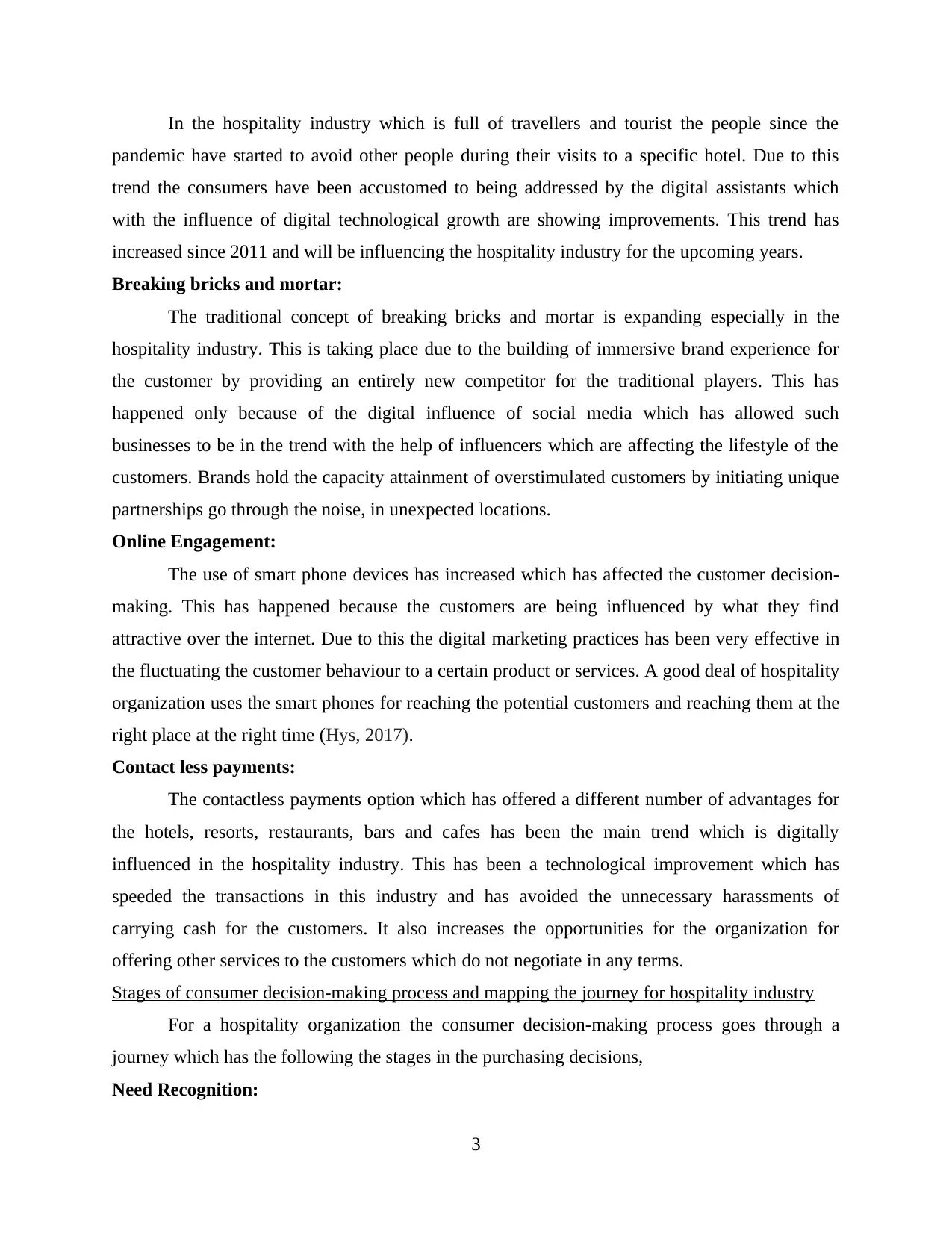
In the hospitality industry which is full of travellers and tourist the people since the
pandemic have started to avoid other people during their visits to a specific hotel. Due to this
trend the consumers have been accustomed to being addressed by the digital assistants which
with the influence of digital technological growth are showing improvements. This trend has
increased since 2011 and will be influencing the hospitality industry for the upcoming years.
Breaking bricks and mortar:
The traditional concept of breaking bricks and mortar is expanding especially in the
hospitality industry. This is taking place due to the building of immersive brand experience for
the customer by providing an entirely new competitor for the traditional players. This has
happened only because of the digital influence of social media which has allowed such
businesses to be in the trend with the help of influencers which are affecting the lifestyle of the
customers. Brands hold the capacity attainment of overstimulated customers by initiating unique
partnerships go through the noise, in unexpected locations.
Online Engagement:
The use of smart phone devices has increased which has affected the customer decision-
making. This has happened because the customers are being influenced by what they find
attractive over the internet. Due to this the digital marketing practices has been very effective in
the fluctuating the customer behaviour to a certain product or services. A good deal of hospitality
organization uses the smart phones for reaching the potential customers and reaching them at the
right place at the right time (Hys, 2017).
Contact less payments:
The contactless payments option which has offered a different number of advantages for
the hotels, resorts, restaurants, bars and cafes has been the main trend which is digitally
influenced in the hospitality industry. This has been a technological improvement which has
speeded the transactions in this industry and has avoided the unnecessary harassments of
carrying cash for the customers. It also increases the opportunities for the organization for
offering other services to the customers which do not negotiate in any terms.
Stages of consumer decision-making process and mapping the journey for hospitality industry
For a hospitality organization the consumer decision-making process goes through a
journey which has the following the stages in the purchasing decisions,
Need Recognition:
3
pandemic have started to avoid other people during their visits to a specific hotel. Due to this
trend the consumers have been accustomed to being addressed by the digital assistants which
with the influence of digital technological growth are showing improvements. This trend has
increased since 2011 and will be influencing the hospitality industry for the upcoming years.
Breaking bricks and mortar:
The traditional concept of breaking bricks and mortar is expanding especially in the
hospitality industry. This is taking place due to the building of immersive brand experience for
the customer by providing an entirely new competitor for the traditional players. This has
happened only because of the digital influence of social media which has allowed such
businesses to be in the trend with the help of influencers which are affecting the lifestyle of the
customers. Brands hold the capacity attainment of overstimulated customers by initiating unique
partnerships go through the noise, in unexpected locations.
Online Engagement:
The use of smart phone devices has increased which has affected the customer decision-
making. This has happened because the customers are being influenced by what they find
attractive over the internet. Due to this the digital marketing practices has been very effective in
the fluctuating the customer behaviour to a certain product or services. A good deal of hospitality
organization uses the smart phones for reaching the potential customers and reaching them at the
right place at the right time (Hys, 2017).
Contact less payments:
The contactless payments option which has offered a different number of advantages for
the hotels, resorts, restaurants, bars and cafes has been the main trend which is digitally
influenced in the hospitality industry. This has been a technological improvement which has
speeded the transactions in this industry and has avoided the unnecessary harassments of
carrying cash for the customers. It also increases the opportunities for the organization for
offering other services to the customers which do not negotiate in any terms.
Stages of consumer decision-making process and mapping the journey for hospitality industry
For a hospitality organization the consumer decision-making process goes through a
journey which has the following the stages in the purchasing decisions,
Need Recognition:
3
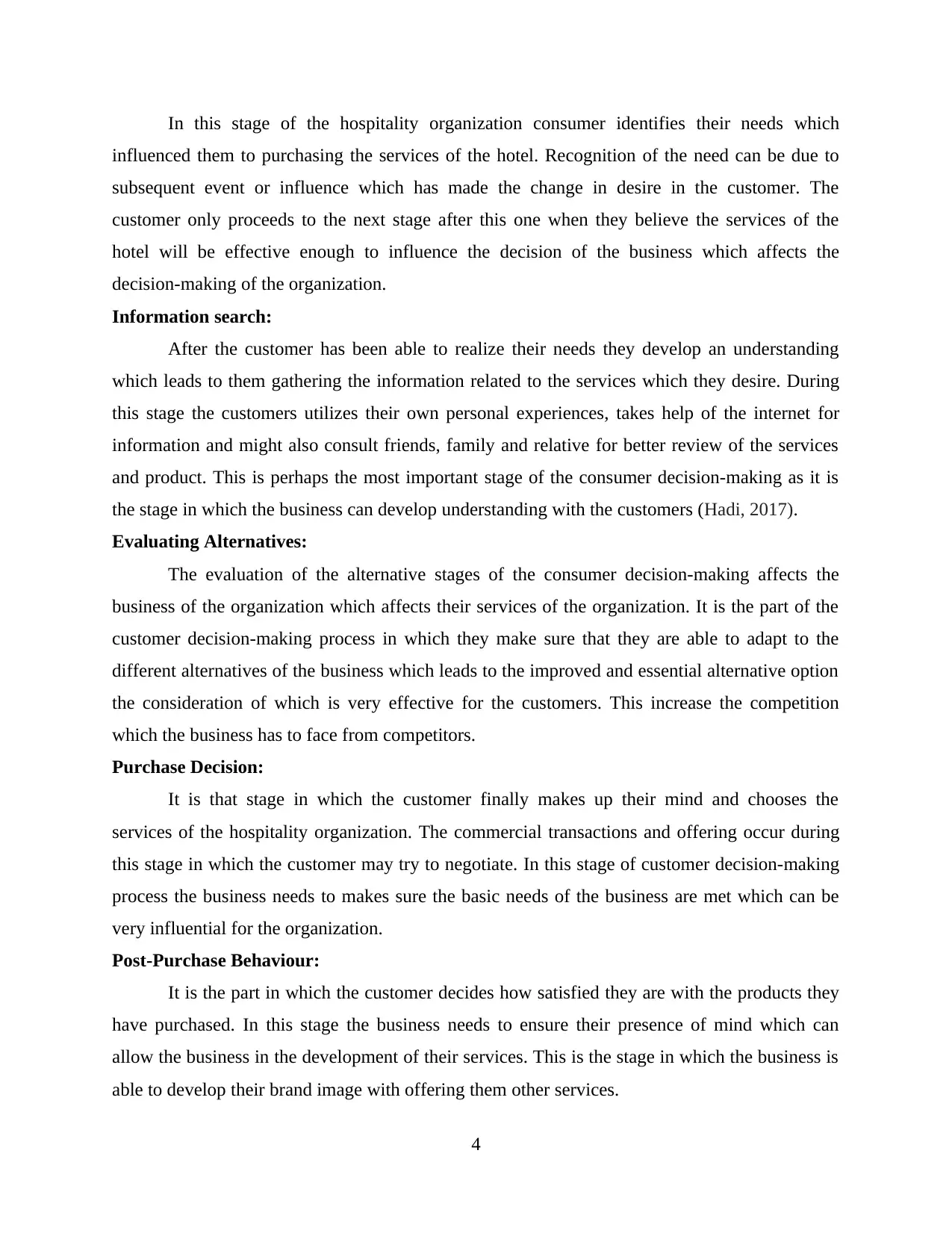
In this stage of the hospitality organization consumer identifies their needs which
influenced them to purchasing the services of the hotel. Recognition of the need can be due to
subsequent event or influence which has made the change in desire in the customer. The
customer only proceeds to the next stage after this one when they believe the services of the
hotel will be effective enough to influence the decision of the business which affects the
decision-making of the organization.
Information search:
After the customer has been able to realize their needs they develop an understanding
which leads to them gathering the information related to the services which they desire. During
this stage the customers utilizes their own personal experiences, takes help of the internet for
information and might also consult friends, family and relative for better review of the services
and product. This is perhaps the most important stage of the consumer decision-making as it is
the stage in which the business can develop understanding with the customers (Hadi, 2017).
Evaluating Alternatives:
The evaluation of the alternative stages of the consumer decision-making affects the
business of the organization which affects their services of the organization. It is the part of the
customer decision-making process in which they make sure that they are able to adapt to the
different alternatives of the business which leads to the improved and essential alternative option
the consideration of which is very effective for the customers. This increase the competition
which the business has to face from competitors.
Purchase Decision:
It is that stage in which the customer finally makes up their mind and chooses the
services of the hospitality organization. The commercial transactions and offering occur during
this stage in which the customer may try to negotiate. In this stage of customer decision-making
process the business needs to makes sure the basic needs of the business are met which can be
very influential for the organization.
Post-Purchase Behaviour:
It is the part in which the customer decides how satisfied they are with the products they
have purchased. In this stage the business needs to ensure their presence of mind which can
allow the business in the development of their services. This is the stage in which the business is
able to develop their brand image with offering them other services.
4
influenced them to purchasing the services of the hotel. Recognition of the need can be due to
subsequent event or influence which has made the change in desire in the customer. The
customer only proceeds to the next stage after this one when they believe the services of the
hotel will be effective enough to influence the decision of the business which affects the
decision-making of the organization.
Information search:
After the customer has been able to realize their needs they develop an understanding
which leads to them gathering the information related to the services which they desire. During
this stage the customers utilizes their own personal experiences, takes help of the internet for
information and might also consult friends, family and relative for better review of the services
and product. This is perhaps the most important stage of the consumer decision-making as it is
the stage in which the business can develop understanding with the customers (Hadi, 2017).
Evaluating Alternatives:
The evaluation of the alternative stages of the consumer decision-making affects the
business of the organization which affects their services of the organization. It is the part of the
customer decision-making process in which they make sure that they are able to adapt to the
different alternatives of the business which leads to the improved and essential alternative option
the consideration of which is very effective for the customers. This increase the competition
which the business has to face from competitors.
Purchase Decision:
It is that stage in which the customer finally makes up their mind and chooses the
services of the hospitality organization. The commercial transactions and offering occur during
this stage in which the customer may try to negotiate. In this stage of customer decision-making
process the business needs to makes sure the basic needs of the business are met which can be
very influential for the organization.
Post-Purchase Behaviour:
It is the part in which the customer decides how satisfied they are with the products they
have purchased. In this stage the business needs to ensure their presence of mind which can
allow the business in the development of their services. This is the stage in which the business is
able to develop their brand image with offering them other services.
4
⊘ This is a preview!⊘
Do you want full access?
Subscribe today to unlock all pages.

Trusted by 1+ million students worldwide
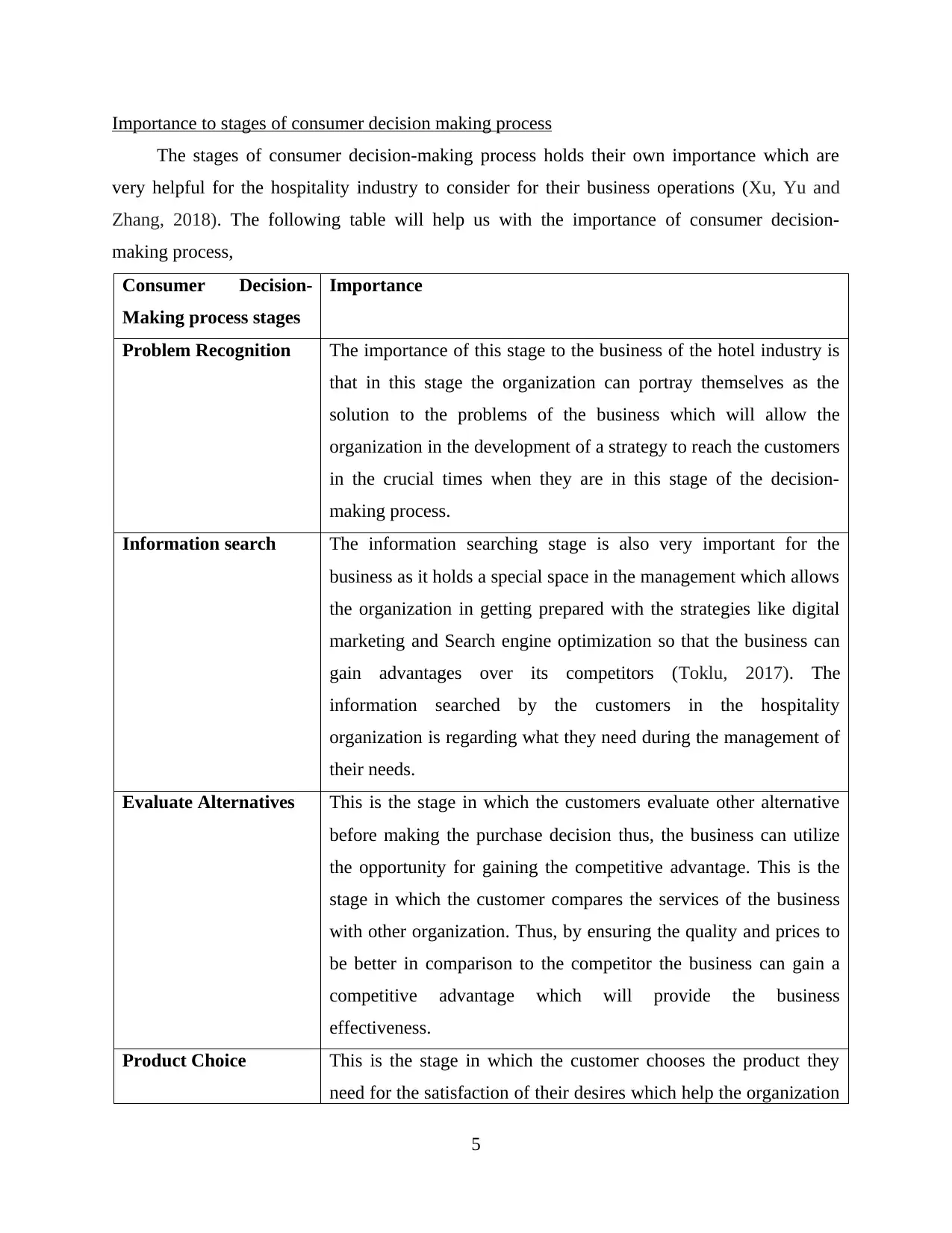
Importance to stages of consumer decision making process
The stages of consumer decision-making process holds their own importance which are
very helpful for the hospitality industry to consider for their business operations (Xu, Yu and
Zhang, 2018). The following table will help us with the importance of consumer decision-
making process,
Consumer Decision-
Making process stages
Importance
Problem Recognition The importance of this stage to the business of the hotel industry is
that in this stage the organization can portray themselves as the
solution to the problems of the business which will allow the
organization in the development of a strategy to reach the customers
in the crucial times when they are in this stage of the decision-
making process.
Information search The information searching stage is also very important for the
business as it holds a special space in the management which allows
the organization in getting prepared with the strategies like digital
marketing and Search engine optimization so that the business can
gain advantages over its competitors (Toklu, 2017). The
information searched by the customers in the hospitality
organization is regarding what they need during the management of
their needs.
Evaluate Alternatives This is the stage in which the customers evaluate other alternative
before making the purchase decision thus, the business can utilize
the opportunity for gaining the competitive advantage. This is the
stage in which the customer compares the services of the business
with other organization. Thus, by ensuring the quality and prices to
be better in comparison to the competitor the business can gain a
competitive advantage which will provide the business
effectiveness.
Product Choice This is the stage in which the customer chooses the product they
need for the satisfaction of their desires which help the organization
5
The stages of consumer decision-making process holds their own importance which are
very helpful for the hospitality industry to consider for their business operations (Xu, Yu and
Zhang, 2018). The following table will help us with the importance of consumer decision-
making process,
Consumer Decision-
Making process stages
Importance
Problem Recognition The importance of this stage to the business of the hotel industry is
that in this stage the organization can portray themselves as the
solution to the problems of the business which will allow the
organization in the development of a strategy to reach the customers
in the crucial times when they are in this stage of the decision-
making process.
Information search The information searching stage is also very important for the
business as it holds a special space in the management which allows
the organization in getting prepared with the strategies like digital
marketing and Search engine optimization so that the business can
gain advantages over its competitors (Toklu, 2017). The
information searched by the customers in the hospitality
organization is regarding what they need during the management of
their needs.
Evaluate Alternatives This is the stage in which the customers evaluate other alternative
before making the purchase decision thus, the business can utilize
the opportunity for gaining the competitive advantage. This is the
stage in which the customer compares the services of the business
with other organization. Thus, by ensuring the quality and prices to
be better in comparison to the competitor the business can gain a
competitive advantage which will provide the business
effectiveness.
Product Choice This is the stage in which the customer chooses the product they
need for the satisfaction of their desires which help the organization
5
Paraphrase This Document
Need a fresh take? Get an instant paraphrase of this document with our AI Paraphraser
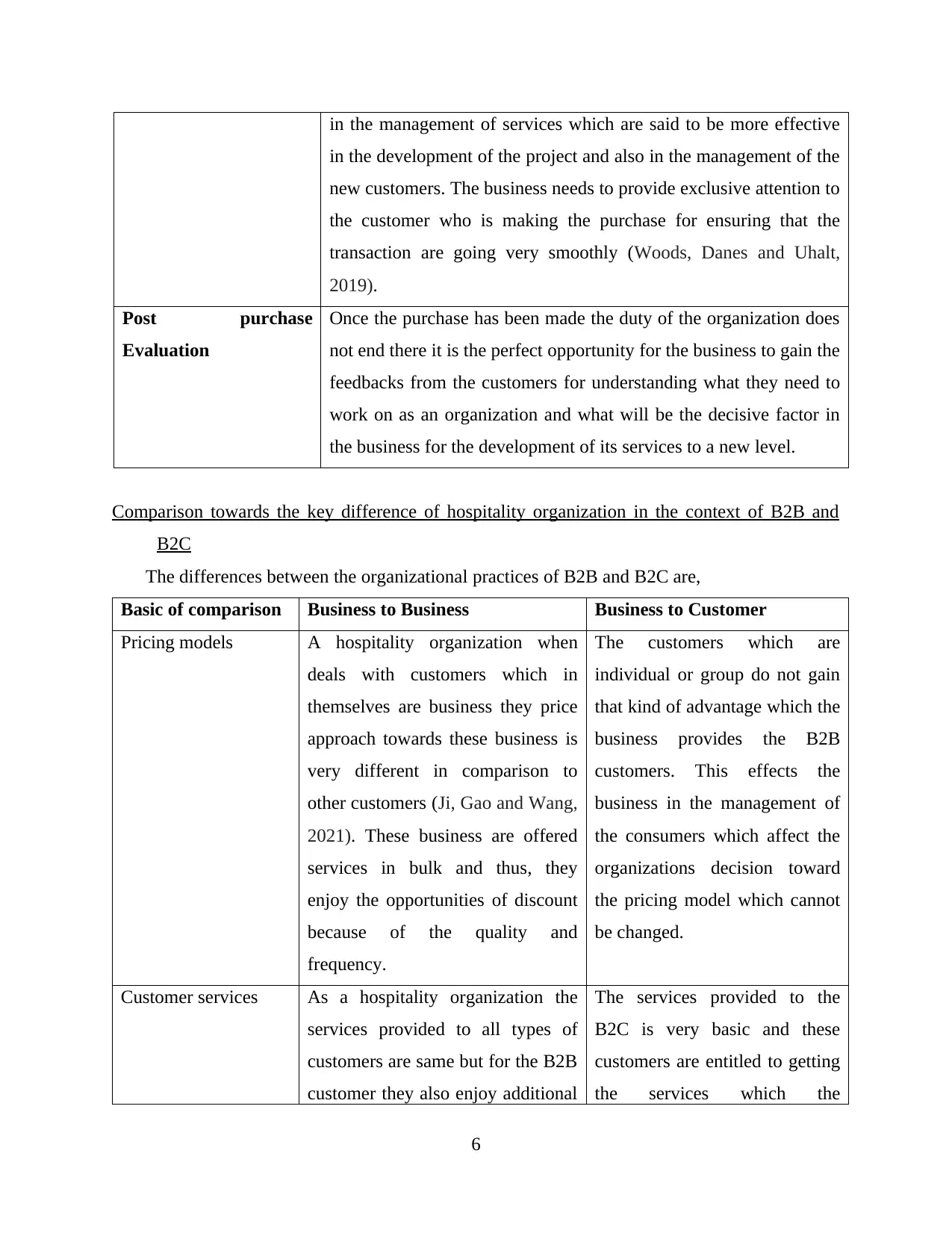
in the management of services which are said to be more effective
in the development of the project and also in the management of the
new customers. The business needs to provide exclusive attention to
the customer who is making the purchase for ensuring that the
transaction are going very smoothly (Woods, Danes and Uhalt,
2019).
Post purchase
Evaluation
Once the purchase has been made the duty of the organization does
not end there it is the perfect opportunity for the business to gain the
feedbacks from the customers for understanding what they need to
work on as an organization and what will be the decisive factor in
the business for the development of its services to a new level.
Comparison towards the key difference of hospitality organization in the context of B2B and
B2C
The differences between the organizational practices of B2B and B2C are,
Basic of comparison Business to Business Business to Customer
Pricing models A hospitality organization when
deals with customers which in
themselves are business they price
approach towards these business is
very different in comparison to
other customers (Ji, Gao and Wang,
2021). These business are offered
services in bulk and thus, they
enjoy the opportunities of discount
because of the quality and
frequency.
The customers which are
individual or group do not gain
that kind of advantage which the
business provides the B2B
customers. This effects the
business in the management of
the consumers which affect the
organizations decision toward
the pricing model which cannot
be changed.
Customer services As a hospitality organization the
services provided to all types of
customers are same but for the B2B
customer they also enjoy additional
The services provided to the
B2C is very basic and these
customers are entitled to getting
the services which the
6
in the development of the project and also in the management of the
new customers. The business needs to provide exclusive attention to
the customer who is making the purchase for ensuring that the
transaction are going very smoothly (Woods, Danes and Uhalt,
2019).
Post purchase
Evaluation
Once the purchase has been made the duty of the organization does
not end there it is the perfect opportunity for the business to gain the
feedbacks from the customers for understanding what they need to
work on as an organization and what will be the decisive factor in
the business for the development of its services to a new level.
Comparison towards the key difference of hospitality organization in the context of B2B and
B2C
The differences between the organizational practices of B2B and B2C are,
Basic of comparison Business to Business Business to Customer
Pricing models A hospitality organization when
deals with customers which in
themselves are business they price
approach towards these business is
very different in comparison to
other customers (Ji, Gao and Wang,
2021). These business are offered
services in bulk and thus, they
enjoy the opportunities of discount
because of the quality and
frequency.
The customers which are
individual or group do not gain
that kind of advantage which the
business provides the B2B
customers. This effects the
business in the management of
the consumers which affect the
organizations decision toward
the pricing model which cannot
be changed.
Customer services As a hospitality organization the
services provided to all types of
customers are same but for the B2B
customer they also enjoy additional
The services provided to the
B2C is very basic and these
customers are entitled to getting
the services which the
6
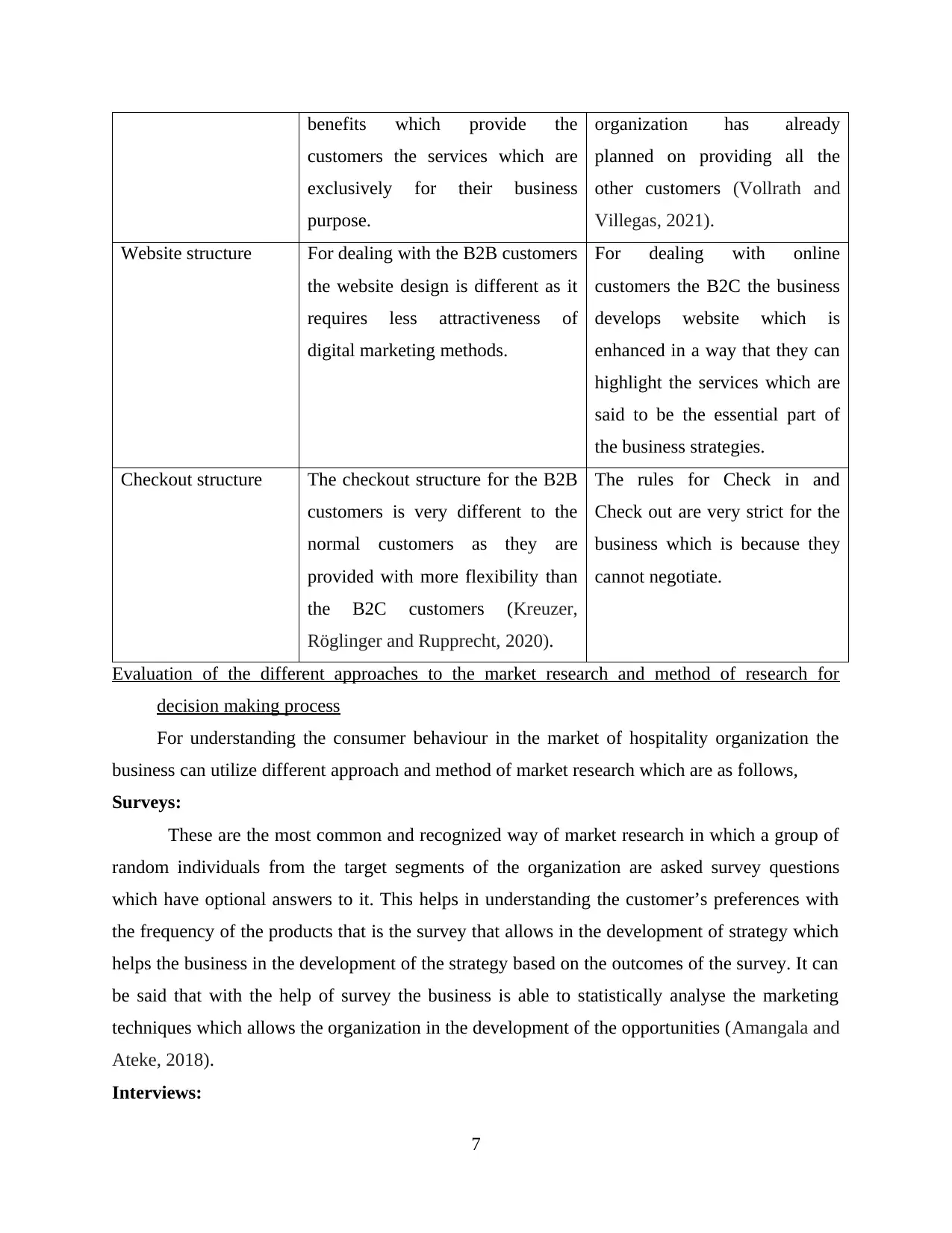
benefits which provide the
customers the services which are
exclusively for their business
purpose.
organization has already
planned on providing all the
other customers (Vollrath and
Villegas, 2021).
Website structure For dealing with the B2B customers
the website design is different as it
requires less attractiveness of
digital marketing methods.
For dealing with online
customers the B2C the business
develops website which is
enhanced in a way that they can
highlight the services which are
said to be the essential part of
the business strategies.
Checkout structure The checkout structure for the B2B
customers is very different to the
normal customers as they are
provided with more flexibility than
the B2C customers (Kreuzer,
Röglinger and Rupprecht, 2020).
The rules for Check in and
Check out are very strict for the
business which is because they
cannot negotiate.
Evaluation of the different approaches to the market research and method of research for
decision making process
For understanding the consumer behaviour in the market of hospitality organization the
business can utilize different approach and method of market research which are as follows,
Surveys:
These are the most common and recognized way of market research in which a group of
random individuals from the target segments of the organization are asked survey questions
which have optional answers to it. This helps in understanding the customer’s preferences with
the frequency of the products that is the survey that allows in the development of strategy which
helps the business in the development of the strategy based on the outcomes of the survey. It can
be said that with the help of survey the business is able to statistically analyse the marketing
techniques which allows the organization in the development of the opportunities (Amangala and
Ateke, 2018).
Interviews:
7
customers the services which are
exclusively for their business
purpose.
organization has already
planned on providing all the
other customers (Vollrath and
Villegas, 2021).
Website structure For dealing with the B2B customers
the website design is different as it
requires less attractiveness of
digital marketing methods.
For dealing with online
customers the B2C the business
develops website which is
enhanced in a way that they can
highlight the services which are
said to be the essential part of
the business strategies.
Checkout structure The checkout structure for the B2B
customers is very different to the
normal customers as they are
provided with more flexibility than
the B2C customers (Kreuzer,
Röglinger and Rupprecht, 2020).
The rules for Check in and
Check out are very strict for the
business which is because they
cannot negotiate.
Evaluation of the different approaches to the market research and method of research for
decision making process
For understanding the consumer behaviour in the market of hospitality organization the
business can utilize different approach and method of market research which are as follows,
Surveys:
These are the most common and recognized way of market research in which a group of
random individuals from the target segments of the organization are asked survey questions
which have optional answers to it. This helps in understanding the customer’s preferences with
the frequency of the products that is the survey that allows in the development of strategy which
helps the business in the development of the strategy based on the outcomes of the survey. It can
be said that with the help of survey the business is able to statistically analyse the marketing
techniques which allows the organization in the development of the opportunities (Amangala and
Ateke, 2018).
Interviews:
7
⊘ This is a preview!⊘
Do you want full access?
Subscribe today to unlock all pages.

Trusted by 1+ million students worldwide
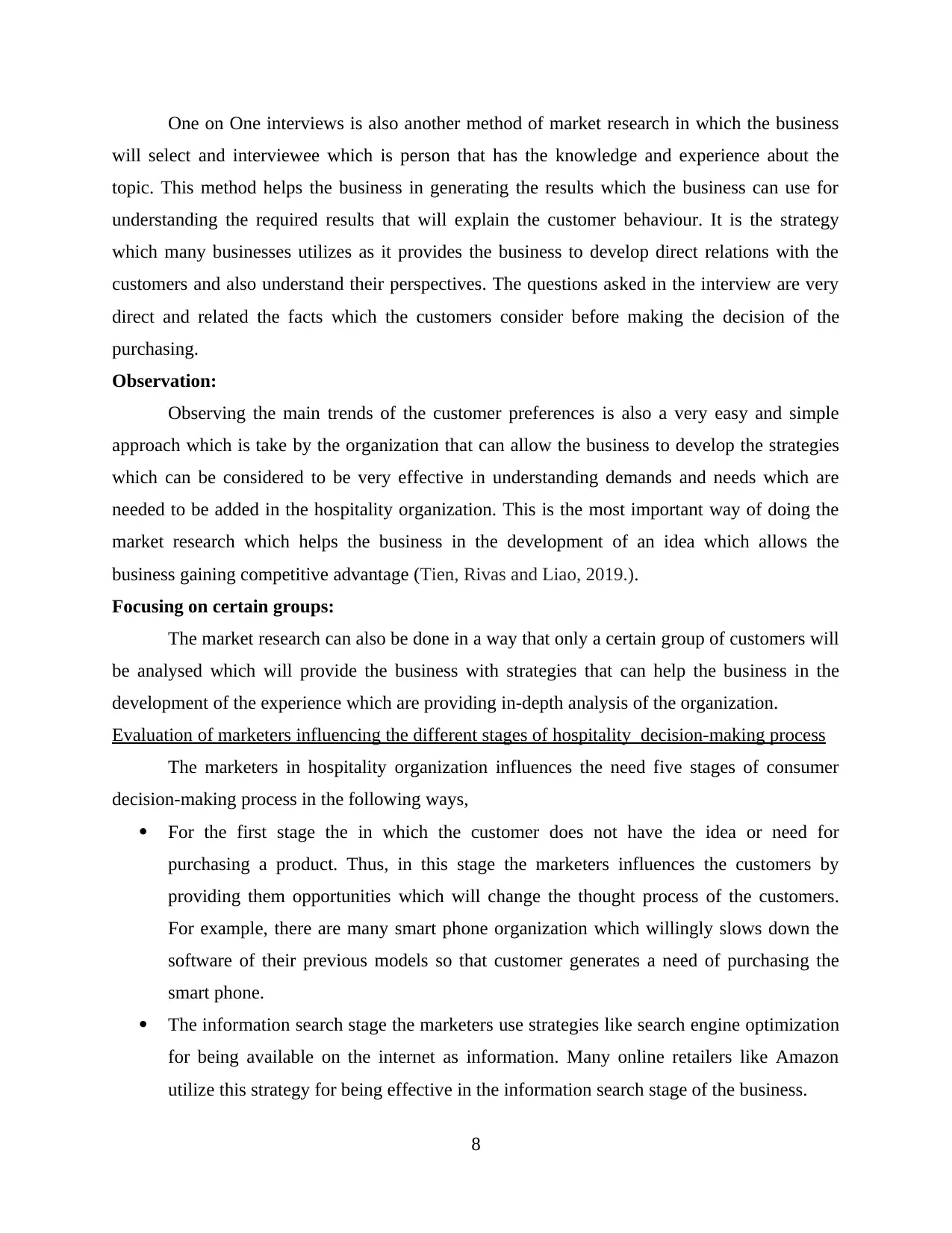
One on One interviews is also another method of market research in which the business
will select and interviewee which is person that has the knowledge and experience about the
topic. This method helps the business in generating the results which the business can use for
understanding the required results that will explain the customer behaviour. It is the strategy
which many businesses utilizes as it provides the business to develop direct relations with the
customers and also understand their perspectives. The questions asked in the interview are very
direct and related the facts which the customers consider before making the decision of the
purchasing.
Observation:
Observing the main trends of the customer preferences is also a very easy and simple
approach which is take by the organization that can allow the business to develop the strategies
which can be considered to be very effective in understanding demands and needs which are
needed to be added in the hospitality organization. This is the most important way of doing the
market research which helps the business in the development of an idea which allows the
business gaining competitive advantage (Tien, Rivas and Liao, 2019.).
Focusing on certain groups:
The market research can also be done in a way that only a certain group of customers will
be analysed which will provide the business with strategies that can help the business in the
development of the experience which are providing in-depth analysis of the organization.
Evaluation of marketers influencing the different stages of hospitality decision-making process
The marketers in hospitality organization influences the need five stages of consumer
decision-making process in the following ways,
For the first stage the in which the customer does not have the idea or need for
purchasing a product. Thus, in this stage the marketers influences the customers by
providing them opportunities which will change the thought process of the customers.
For example, there are many smart phone organization which willingly slows down the
software of their previous models so that customer generates a need of purchasing the
smart phone.
The information search stage the marketers use strategies like search engine optimization
for being available on the internet as information. Many online retailers like Amazon
utilize this strategy for being effective in the information search stage of the business.
8
will select and interviewee which is person that has the knowledge and experience about the
topic. This method helps the business in generating the results which the business can use for
understanding the required results that will explain the customer behaviour. It is the strategy
which many businesses utilizes as it provides the business to develop direct relations with the
customers and also understand their perspectives. The questions asked in the interview are very
direct and related the facts which the customers consider before making the decision of the
purchasing.
Observation:
Observing the main trends of the customer preferences is also a very easy and simple
approach which is take by the organization that can allow the business to develop the strategies
which can be considered to be very effective in understanding demands and needs which are
needed to be added in the hospitality organization. This is the most important way of doing the
market research which helps the business in the development of an idea which allows the
business gaining competitive advantage (Tien, Rivas and Liao, 2019.).
Focusing on certain groups:
The market research can also be done in a way that only a certain group of customers will
be analysed which will provide the business with strategies that can help the business in the
development of the experience which are providing in-depth analysis of the organization.
Evaluation of marketers influencing the different stages of hospitality decision-making process
The marketers in hospitality organization influences the need five stages of consumer
decision-making process in the following ways,
For the first stage the in which the customer does not have the idea or need for
purchasing a product. Thus, in this stage the marketers influences the customers by
providing them opportunities which will change the thought process of the customers.
For example, there are many smart phone organization which willingly slows down the
software of their previous models so that customer generates a need of purchasing the
smart phone.
The information search stage the marketers use strategies like search engine optimization
for being available on the internet as information. Many online retailers like Amazon
utilize this strategy for being effective in the information search stage of the business.
8
Paraphrase This Document
Need a fresh take? Get an instant paraphrase of this document with our AI Paraphraser
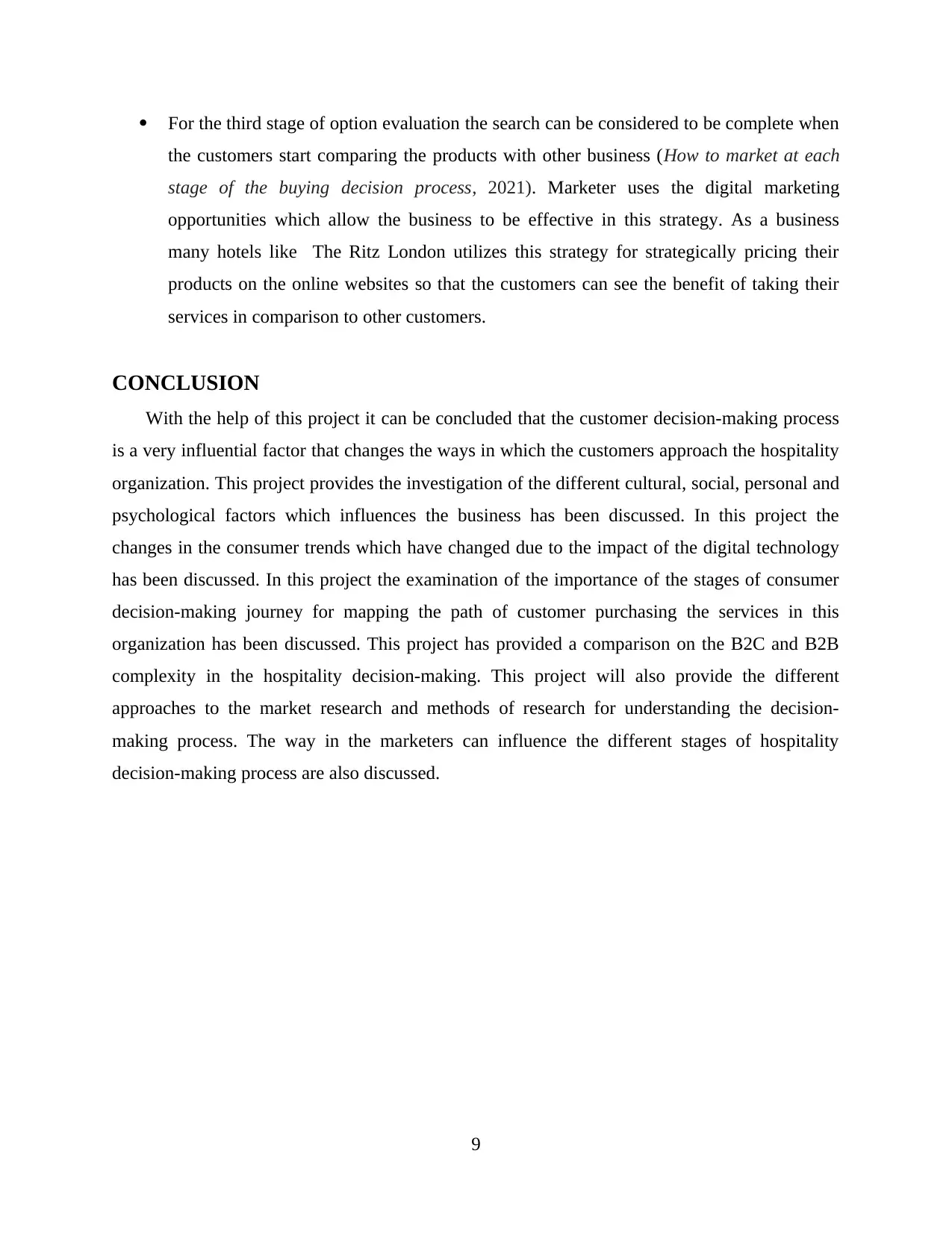
For the third stage of option evaluation the search can be considered to be complete when
the customers start comparing the products with other business (How to market at each
stage of the buying decision process, 2021). Marketer uses the digital marketing
opportunities which allow the business to be effective in this strategy. As a business
many hotels like The Ritz London utilizes this strategy for strategically pricing their
products on the online websites so that the customers can see the benefit of taking their
services in comparison to other customers.
CONCLUSION
With the help of this project it can be concluded that the customer decision-making process
is a very influential factor that changes the ways in which the customers approach the hospitality
organization. This project provides the investigation of the different cultural, social, personal and
psychological factors which influences the business has been discussed. In this project the
changes in the consumer trends which have changed due to the impact of the digital technology
has been discussed. In this project the examination of the importance of the stages of consumer
decision-making journey for mapping the path of customer purchasing the services in this
organization has been discussed. This project has provided a comparison on the B2C and B2B
complexity in the hospitality decision-making. This project will also provide the different
approaches to the market research and methods of research for understanding the decision-
making process. The way in the marketers can influence the different stages of hospitality
decision-making process are also discussed.
9
the customers start comparing the products with other business (How to market at each
stage of the buying decision process, 2021). Marketer uses the digital marketing
opportunities which allow the business to be effective in this strategy. As a business
many hotels like The Ritz London utilizes this strategy for strategically pricing their
products on the online websites so that the customers can see the benefit of taking their
services in comparison to other customers.
CONCLUSION
With the help of this project it can be concluded that the customer decision-making process
is a very influential factor that changes the ways in which the customers approach the hospitality
organization. This project provides the investigation of the different cultural, social, personal and
psychological factors which influences the business has been discussed. In this project the
changes in the consumer trends which have changed due to the impact of the digital technology
has been discussed. In this project the examination of the importance of the stages of consumer
decision-making journey for mapping the path of customer purchasing the services in this
organization has been discussed. This project has provided a comparison on the B2C and B2B
complexity in the hospitality decision-making. This project will also provide the different
approaches to the market research and methods of research for understanding the decision-
making process. The way in the marketers can influence the different stages of hospitality
decision-making process are also discussed.
9
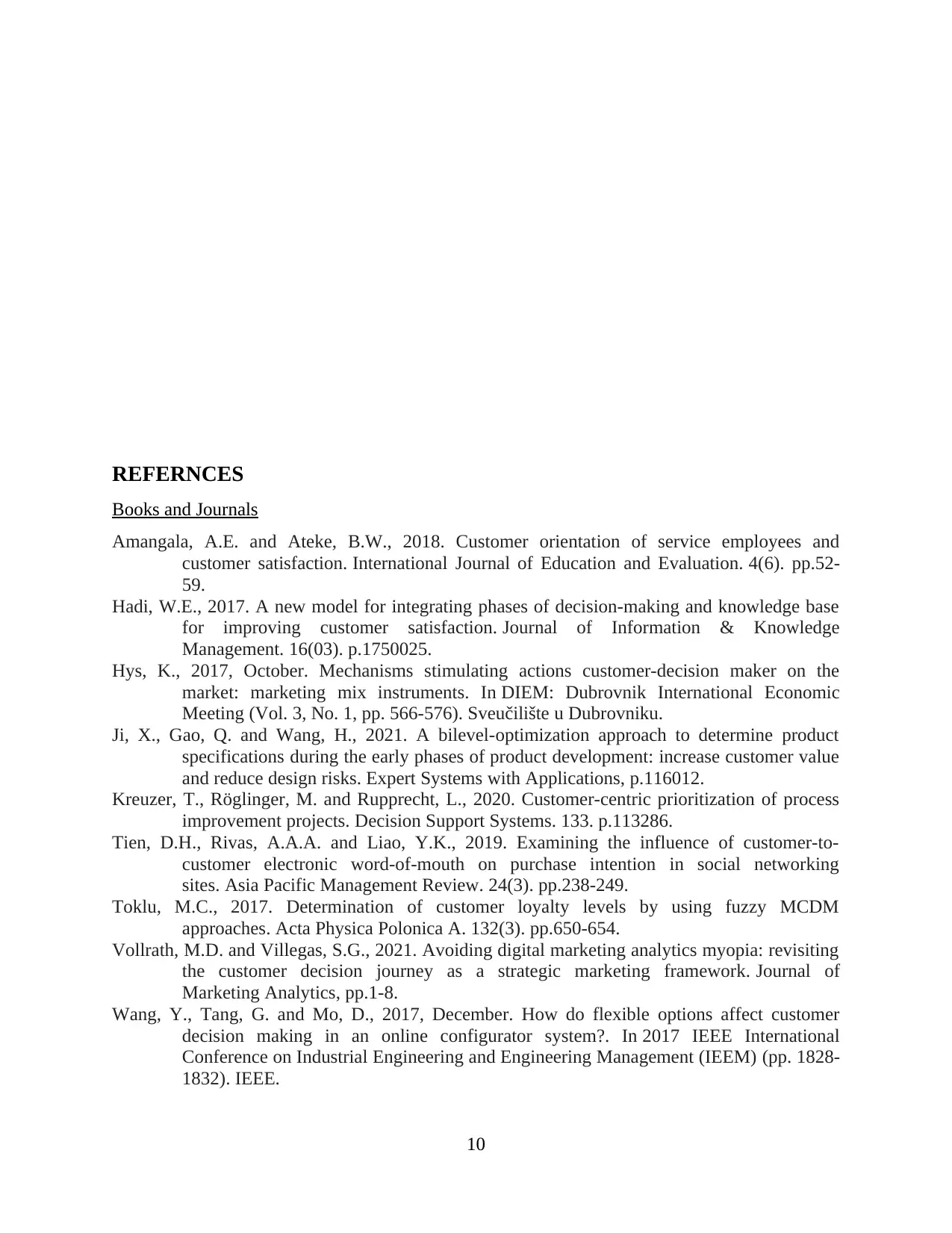
REFERNCES
Books and Journals
Amangala, A.E. and Ateke, B.W., 2018. Customer orientation of service employees and
customer satisfaction. International Journal of Education and Evaluation. 4(6). pp.52-
59.
Hadi, W.E., 2017. A new model for integrating phases of decision-making and knowledge base
for improving customer satisfaction. Journal of Information & Knowledge
Management. 16(03). p.1750025.
Hys, K., 2017, October. Mechanisms stimulating actions customer-decision maker on the
market: marketing mix instruments. In DIEM: Dubrovnik International Economic
Meeting (Vol. 3, No. 1, pp. 566-576). Sveučilište u Dubrovniku.
Ji, X., Gao, Q. and Wang, H., 2021. A bilevel-optimization approach to determine product
specifications during the early phases of product development: increase customer value
and reduce design risks. Expert Systems with Applications, p.116012.
Kreuzer, T., Röglinger, M. and Rupprecht, L., 2020. Customer-centric prioritization of process
improvement projects. Decision Support Systems. 133. p.113286.
Tien, D.H., Rivas, A.A.A. and Liao, Y.K., 2019. Examining the influence of customer-to-
customer electronic word-of-mouth on purchase intention in social networking
sites. Asia Pacific Management Review. 24(3). pp.238-249.
Toklu, M.C., 2017. Determination of customer loyalty levels by using fuzzy MCDM
approaches. Acta Physica Polonica A. 132(3). pp.650-654.
Vollrath, M.D. and Villegas, S.G., 2021. Avoiding digital marketing analytics myopia: revisiting
the customer decision journey as a strategic marketing framework. Journal of
Marketing Analytics, pp.1-8.
Wang, Y., Tang, G. and Mo, D., 2017, December. How do flexible options affect customer
decision making in an online configurator system?. In 2017 IEEE International
Conference on Industrial Engineering and Engineering Management (IEEM) (pp. 1828-
1832). IEEE.
10
Books and Journals
Amangala, A.E. and Ateke, B.W., 2018. Customer orientation of service employees and
customer satisfaction. International Journal of Education and Evaluation. 4(6). pp.52-
59.
Hadi, W.E., 2017. A new model for integrating phases of decision-making and knowledge base
for improving customer satisfaction. Journal of Information & Knowledge
Management. 16(03). p.1750025.
Hys, K., 2017, October. Mechanisms stimulating actions customer-decision maker on the
market: marketing mix instruments. In DIEM: Dubrovnik International Economic
Meeting (Vol. 3, No. 1, pp. 566-576). Sveučilište u Dubrovniku.
Ji, X., Gao, Q. and Wang, H., 2021. A bilevel-optimization approach to determine product
specifications during the early phases of product development: increase customer value
and reduce design risks. Expert Systems with Applications, p.116012.
Kreuzer, T., Röglinger, M. and Rupprecht, L., 2020. Customer-centric prioritization of process
improvement projects. Decision Support Systems. 133. p.113286.
Tien, D.H., Rivas, A.A.A. and Liao, Y.K., 2019. Examining the influence of customer-to-
customer electronic word-of-mouth on purchase intention in social networking
sites. Asia Pacific Management Review. 24(3). pp.238-249.
Toklu, M.C., 2017. Determination of customer loyalty levels by using fuzzy MCDM
approaches. Acta Physica Polonica A. 132(3). pp.650-654.
Vollrath, M.D. and Villegas, S.G., 2021. Avoiding digital marketing analytics myopia: revisiting
the customer decision journey as a strategic marketing framework. Journal of
Marketing Analytics, pp.1-8.
Wang, Y., Tang, G. and Mo, D., 2017, December. How do flexible options affect customer
decision making in an online configurator system?. In 2017 IEEE International
Conference on Industrial Engineering and Engineering Management (IEEM) (pp. 1828-
1832). IEEE.
10
⊘ This is a preview!⊘
Do you want full access?
Subscribe today to unlock all pages.

Trusted by 1+ million students worldwide
1 out of 13
Related Documents
Your All-in-One AI-Powered Toolkit for Academic Success.
+13062052269
info@desklib.com
Available 24*7 on WhatsApp / Email
![[object Object]](/_next/static/media/star-bottom.7253800d.svg)
Unlock your academic potential
Copyright © 2020–2026 A2Z Services. All Rights Reserved. Developed and managed by ZUCOL.



